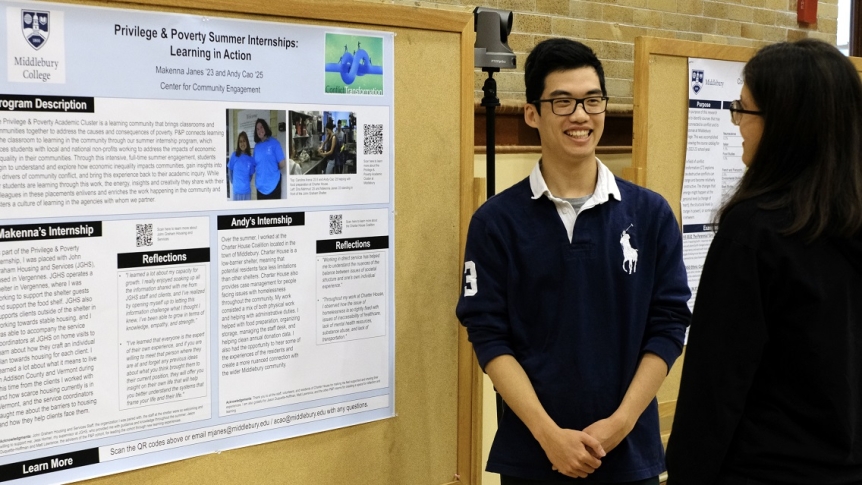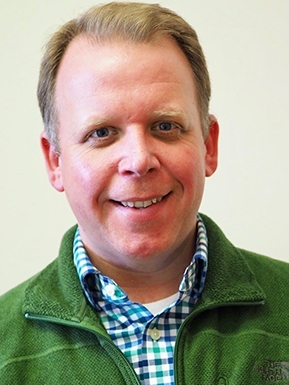Curriculum and Coursework

The Privilege & Poverty Academic Cluster (P&P) encourages students to explore issues surrounding economic inequality from a variety of intellectual perspectives and disciplines.
Self-designed. Self-directed. Learning Your Way.
Privilege & Poverty is a flexible program that caters to students’ particular interests while ensuring they get a proper balance of depth, breadth, and connection among the courses they choose. Students follow a course of study that provides coherence and structure while allowing considerable freedom to pursue disciplinary or topical interests.
Those who satisfy all of the requirements receive a certificate of completion for the Cluster.
Learning Outcomes
The P&P curriculum is structured around four key learning outcomes:
- Critically examine the material, social, and environmental contexts of economic inequality.
- Contribute to and support a learning community.
- Develop skills, through experiential learning, to work authentically in community to address the causes and consequences of poverty.
- Cultivate a commitment to and capacity for lifelong ethical participation in society.
In order to complete the P&P program, you must complete the basic requirements and be able to demonstrate evidence of your progress toward competency in the four learning outcomes. Students should meet regularly with the academic director to discuss curricular choices.
Through your coursework and experiences, you will develop key competencies toward the learning outcomes that guide the program:
| Learning Outcome | Degrees of Competency | ||
| Benchmark | Milestone | Capstone | |
| Students will critically examine the material, social, and environmental contexts of economic inequality | Identify the limitations of traditional academic disciplines and settings to confront the complexities of economic inequality | Recognize the role that privilege and power play in the production of poverty | Intentionally integrate multiple theoretical and empirical perspectives to identify how economic inequality today is the product of past and present systems, structures and behaviors |
| Students will contribute to and support a learning community | Acknowledge how participation in a learning community and cohort involves respecting the experiences of others | Understand that because poverty is experienced in communities and not only by individuals, the causes and consequences of poverty must be addressed in communities and not only by individuals |
Build connections across classrooms while broadly encountering Middlebury’s campus as a site of intellectual development, personal growth, and civic action |
| Through experiential learning, students will develop skills to work authentically in community to address the causes and consequences of poverty | Identify your positionality in relation to the organization you are working with and the community in which it works. | Develop a nuanced awareness of how to enter into communities in a participatory manner. | Apply your understanding of your positionality, through your understanding of authentic participation, to demonstrate collaborative, reciprocal engagement with communities. |
| Students will cultivate a commitment to and capacity for lifelong ethical participation in society | Appreciate how addressing the causes and consequences of economic inequality is a lifelong responsibility | Articulate how deep engagement with issues related to privilege and poverty may strengthen, challenge, and transform personal values and professional goals | Develop and apply the self-awareness required to meaningfully engage pathways of social change as members of local, national, or international communities |
Course Work
In order to be identified as having completed the cluster, students should complete the following sequence:
| Foundations Course | Situates the knowledge of economic inequality in a specific academic discipline, thematic area, or geographic region. | Note: Foundations and Electives courses should represent at least three different academic departments. |
| Three Electives | Choose from any College course dealing with the causes and/or consequences of privilege and poverty. | Note: No more than two of the Foundations and Elective courses should come from the same academic department. |
| Experiential Learning Gateway Course | 1/2 credit spring course (INTD 0226) preparing students for their experiential learning internship. | Note: This course is required as preparation for experiential learning. |
| Experiential Learning Opportunity | Choose from local or national internship offerings. | Note: While most students fulfill the experiential learning requirement through a summer P&P internship, other experiences may qualify. |
| Experiential Learning Capstone Course | 1/2 credit fall course (INTD 0204) helping students integrate their internship experiences into their academic work. | Note: This course is required as a post-experience reflection to integrate experiential learning into academic work. |
There are a wide range of electives across the disciplines, and they count toward completion of the P&P Cluster even if they are also meeting major or minor requirements.
Explore our current course offerings to see what fits your interests and goals.
Experiential Learning Component (Internship)
A critical element of the P&P curriculum is the experiential learning component (i.e. a summer internship) which provides the opportunity to experience the dynamics of economic inequality, working collaboratively with communities impacted by poverty and reflecting on your experience with a cohort of other P&P summer interns.
Visit our P&P Internships page to learn more about P&P summer internships.
Integrating Coursework and Experiential Learning
The Experiential Learning gateway and capstone 1/2 credit courses wrap around the experiential learning opportunity to ground the experience in the wider context of the student’s academic inquiry. Additionally, the Cluster is structured so that students can design their program around their specific interests. The framework of the program sets the stage for you to bring the full spectrum of your learning to bear across your academic work.
You will assess your progress toward the learning outcomes using evidence of your learning gathered from all of your activities - coursework, experiential learning, co-curricular experiences and other types of engagement as you choose. P&P faculty and staff can support you in understanding your learning progress, and the Experiential Learning Capstone in particular is an excellent venue for this summative exploration.
There are many ways to tailor the P&P curriculum to your interests. Below are just some of the examples of how you can connect courses to issues that matter to you and explore those issues further through a funded internship.
| Interest Areas | Sample Courses | Sample Internships |
|---|---|---|
| Environmental and Food Justice | FOOD 0281 Food, Power, Justice HIST 0209 History of U.S. Food Politics ENVS 1044 Food, Farms, Future: Vermont |
HOPE |
| Health | ECON 0200 Health Economics and Policy INTD 0257 Global Health INTD 0211 Public Health of Disasters |
Open Door Clinic |
| Immigration | SOCI 0274 Global Flows: Causes, Dynamics, and Consequences of International Migration AMST 0175 Immigrant America LNGT 0102 Intro to Sociolinguistics |
New American Pathways |
| Education | EDST 0115 Education in the USA SOCI 0351 Education and Social Policy EDST 0215 Culturally Responsible Pedagogy |
The Teen Center |
| Housing and Communities | ENVS 0210 Social Class and the Environment SOCI 0235 The City and Its People GEOG 0216 Rural Geography |
Charter House/John Graham Shelter |
| Criminal Justice | SOCI 0478 Sociology of Punishment PSCI 0260 The Political Economy of Drug Trafficking AMST 0313 Vermont Incarcerated |
DC Public Defender |
| Race and Gender | PSYC 0321 The Psychology of Inequality SOCI 0356 The Continuing Significance of Race in the U.S. GSFS 0329Politics of Reproduction |
Atria Collective |
Connect with Us
Ready to get started?
To discuss your classroom-based curricular interests and academic course options, contact P&P Academic Director Matt Lawrence.
To discuss the experiential learning (internship) component of P&P, contact CCE Assistant Director Jason Duquette-Hoffman.



